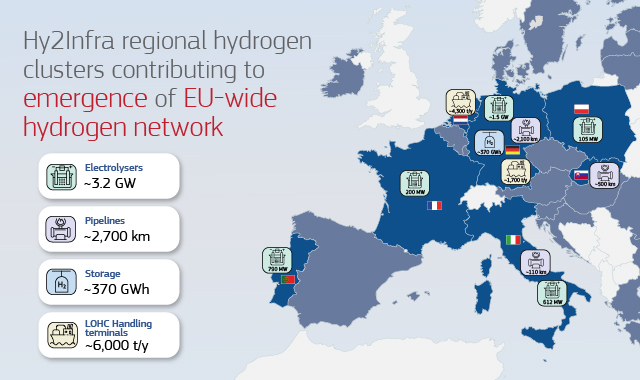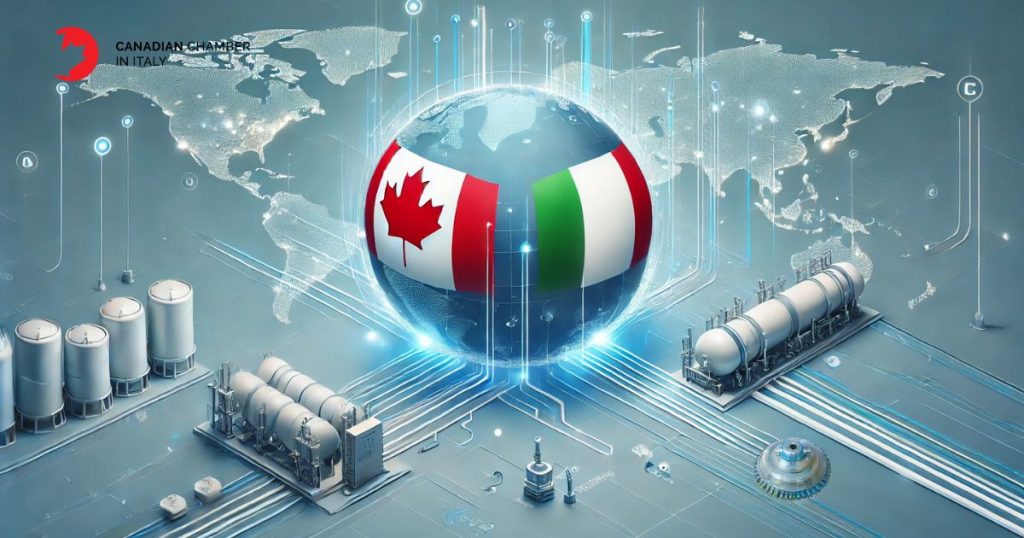Investment in hydrogen innovation, with new funds dedicated to trade and clean energy infrastructure, crucial for the global energy transition.
Hydrogen, recognised as one of the main solutions for the global energy transition, is becoming the focus of new international collaborations. Among these, the alliance between Canada and Italy emerges, two nations committed to leading the transition towards clean and sustainable energy. Both countries share a common vision: to reduce greenhouse gas emissions and develop innovative infrastructure to support hydrogen trade and use.
The recent announcement by the Italian government of a €994 million fund to support clean energy projects is a significant step in this direction.
At the same time, Canada has positioned itself as a key player in the production and export of clean hydrogen, thanks to abundant natural resources and policies aimed at supporting the hydrogen industry.
This new phase of cooperation between Canada and Italy not only promotes technological and infrastructural development, but also contributes to strengthening the economic and political ties between the two countries. In a global context where clean energy has become a priority, the Italian-Canadian partnership is an example of how nations can work together to tackle future energy challenges.
Italy’s €994 million hydrogen fund: an opportunity for cooperation with Canada
Italy has recently activated a significant fund of 994 million euro, part of the Important Project of Common European Interest (IPCEI) Hy2Infra, intended to support the development of infrastructures for this form of energy.
This investment, authorised by the European Commission as part of a wider plan involving seven European countries for a total of 6.9 billion euros, represents a unique opportunity to strengthen cooperation between Italy and its international partners, including Canada.
The Hy2Infra fund is designed to provide incentives for Italian companies involved in the creation of a hydrogen infrastructure network at European level. This project is crucial not only for Italy, but for the whole continent, as it aims to develop a robust and widespread infrastructure that can support large-scale hydrogen trade and use.
For Canada, which is investing heavily in the production of clean hydrogen, the Italian fund opens up new prospects for collaboration. Canadian companies, with their expertise in hydrogen technologies, could play a key role in the implementation of infrastructure projects in Italy. In addition, the alliance between Canada and Italy could facilitate access to the Canadian market to Europe by using Italy as a hub for hydrogen distribution.
 This synergy, supported by significant investments, not only strengthens the position of both nations in the global energy landscape, but also promotes sustainable economic development and the creation of skilled jobs. At a time when energy security and sustainability are at the centre of international debate, Italy and Canada are demonstrating how strategic collaboration can translate into concrete benefits for their economies and the environment.
This synergy, supported by significant investments, not only strengthens the position of both nations in the global energy landscape, but also promotes sustainable economic development and the creation of skilled jobs. At a time when energy security and sustainability are at the centre of international debate, Italy and Canada are demonstrating how strategic collaboration can translate into concrete benefits for their economies and the environment.
The hydrogen trade between Canada and Italy: perspectives and strategies. The point of view of the Canadian Chamber in Italy
Analysts at the Canadian Chamber in Italy believe that hydrogen trade between Canada and Italy represents one of the most promising areas of bilateral cooperation, offering significant benefits for both nations. On the one hand, Canada has abundant natural resources and advanced technologies for the production of clean hydrogen; on the other, Italy is positioning itself as a strategic hub for Europe thanks to its infrastructure network and recently announced investments.
The prospects for Canadian hydrogen exports to Italy are particularly interesting for several reasons. First, Canada is one of the countries with the highest potential to produce green hydrogen, thanks to its capacity to generate electricity from renewable sources such as hydro, wind and solar. This hydrogen, produced without carbon emissions, can become an essential component of the Italian strategy to achieve the decarbonization targets set by the European Union.
However, the transatlantic hydrogen trade also presents a number of challenges that must be addressed if the potential of this cooperation is to be fully realised. Logistics issues such as the transport and safe storage of hydrogen require innovative solutions. In addition, specialized infrastructure is needed for the distribution and end-use of hydrogen, both in Canada and Italy.
Strategically, both countries are exploring different ways of cooperating to overcome these challenges. The bilateral dialogue focuses not only on the creation of hydrogen trade corridors, but also on sharing technologies and expertise. Italian companies, with government support, are seeking partnerships with Canadian counterparts to develop joint projects that can benefit from existing resources and capabilities.
In this context, hydrogen is not only seen as a fuel of the future, but as a catalyst for wider economic cooperation between Canada and Italy. This partnership could become a model of how nations can work together to address global energy and climate change challenges, creating new opportunities for sustainable growth and technological innovation.






